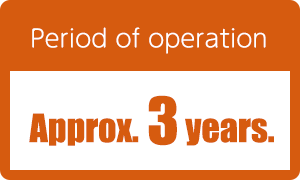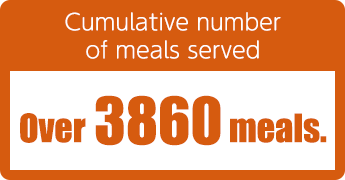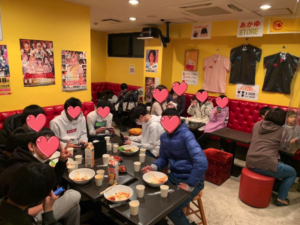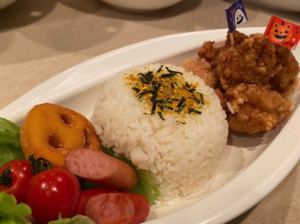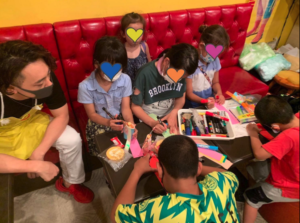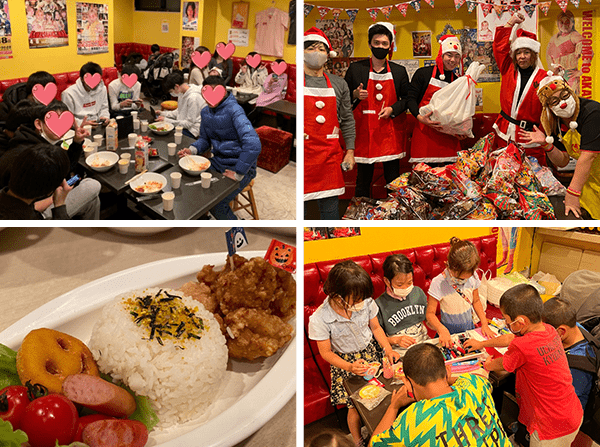
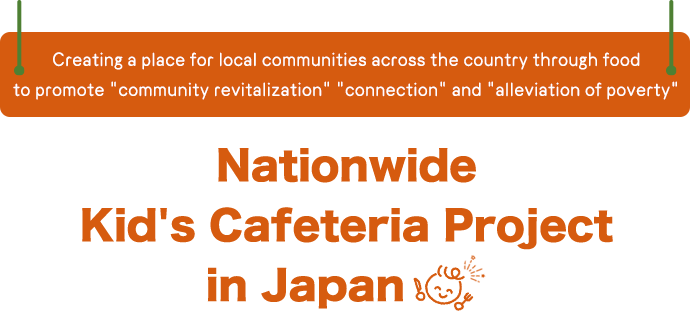
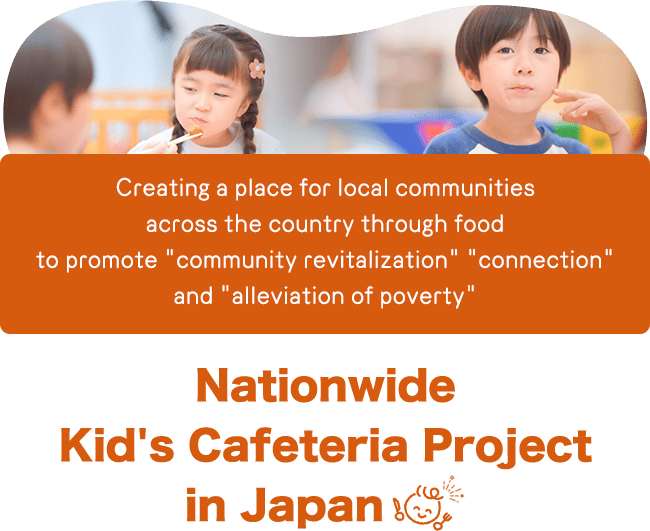
Your support will help to create a place
for warm meals and children with smiles!
Your support will help to create a place for warm meals and children with smiles!
You can cancel or suspend your donation at any time.
We have continued to operate our Kid's Cafeteria!
We have continued to operate our Kid's Cafeteria!
What is "Kid's Cafeteria" ?
What kind of activity?
What is "Kid's Cafeteria" ?
What kind of activity?
It is mainly operated by volunteers from private organizations and individuals (local residents, etc.) throughout Japan. The frequency of events, participants, participation fees, menus, etc. differ from cafeteria to cafeteria, and there are various forms of management.
In addition, kid’s cafeterias not only provide meals, they also play a role in:
- The elimination of children who eat alone.
- Creating a place for children to stay.
- Connections between children and adults in the community.
- A place of communication for local residents.
- The elimination of children who eat alone.
- Creating a place for children to stay.
- Connections between children and adults in the community.
- A place of communication for local residents.
Poverty in Japan is more a problemof mental hardship than lack of material
Poverty in Japan is more a problem of mental hardship than lack of material
“One in seven children in Japan lives in poverty.”
Although this story has been in the media a lot lately Not many people yet understand the real issues of poverty.
As evidence of this, when people hear the word “poverty” they often think of developing countries such as those in Africa where people don’t even have enough food, clothing, and shelter.
The nature of poverty in Japan and developing countries is slightly different.
Let us compare the specific differences.
The difference between poverty in Japan and poverty in developing countries.
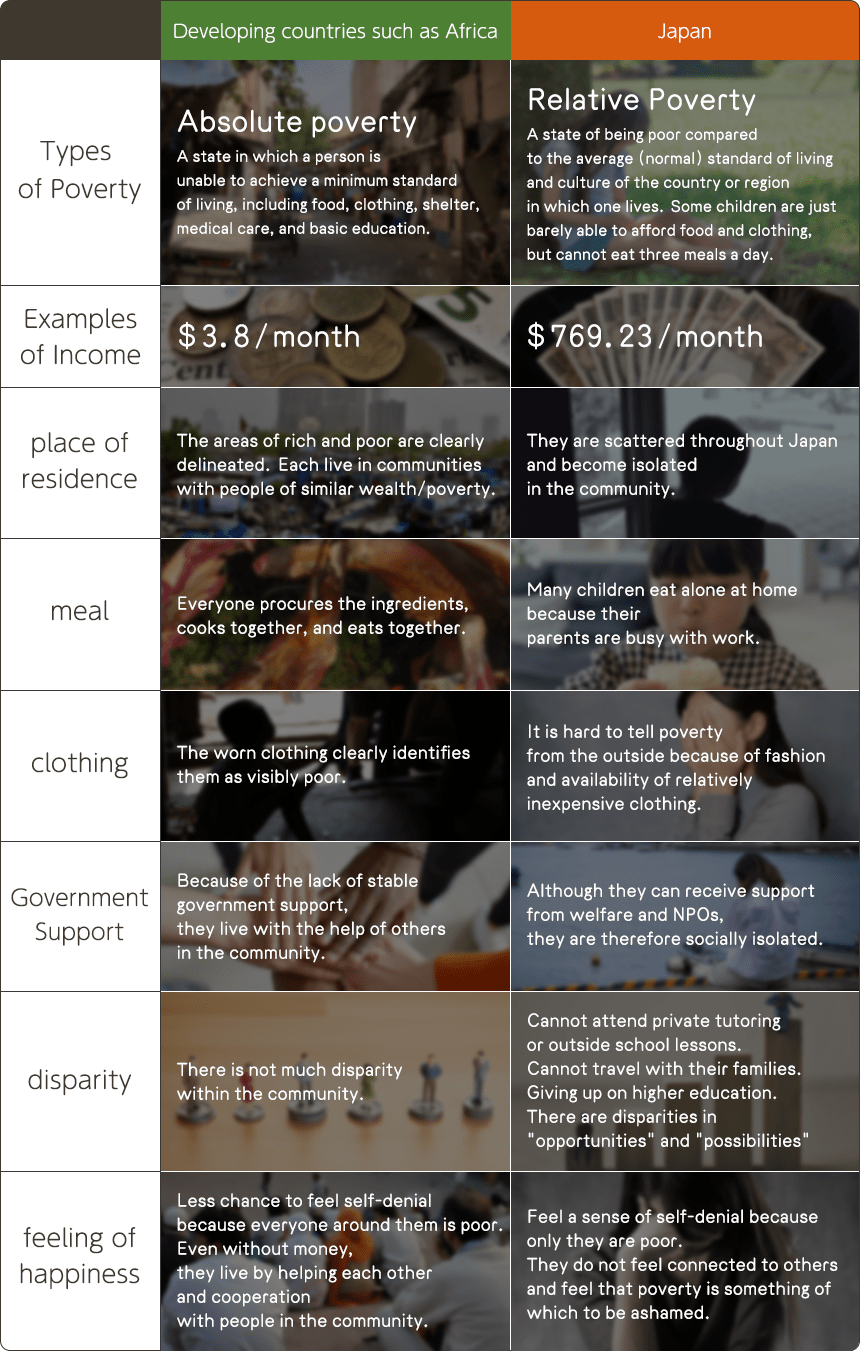
- Material poverty is a major problem in developing countries.
- In Japan, people are more likely to feel unhappy because of the isolation and mental problems caused by relative poverty.
- Material poverty is a major problem in developing countries.
- In Japan, people are more likely to feel unhappy because of the isolation and mental problems caused by relative poverty.
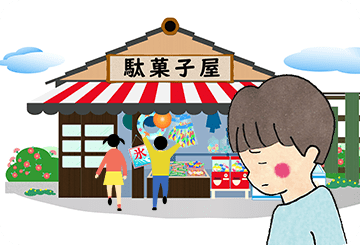
Even if I do go out, I can’t buy anything and just end up watching my friends buy things.”
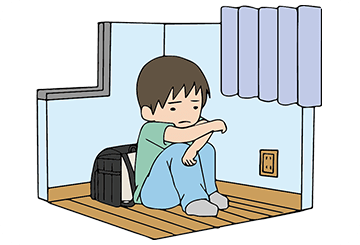
And because I feel guilty/ashamed about it, I can’t go over to my friends’ houses either.”

I feel isolated because I can’t join class group chats.”
They become unable to have the sense of hope and dreams for the future that teenagers should be able to have.
Such a situation is a major problem of child poverty in Japan.
In particular, 48.1% of single-parent families (about 1 in 2 families) live in relative poverty, according to the Ministry of Health, Labor and Welfare.
Many children eat alone; therefore their poverty is not easily seen, which makes it difficult to help them.
What Japan needs now is
A place for children to connect with the local community through food.
What Japan needs now is
A place for children to connect with the local community through food.
If there is a “Kid’s Cafeteria” in the community, where anyone could feel free to participate, it will help to prevent the isolation caused by poverty and create community interaction.
This will help to create a healthy community, such as “a society where people can help each other in times of need” and “a society where children can have dreams”.
Especially meals (communal meals) are the easiest way to bring people together and a great way to interact with people.
For this reason, Kid’s Cafeteria activities have been spreading throughout Japan in recent years.
According to a survey conducted in 2021, there are about 6,000 such cafeterias nationwide.
However, the number of Kid’s Cafeteria is still insufficient for the number of children in need.
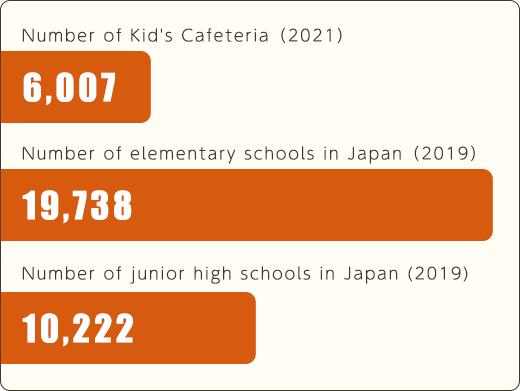
The Nationwide Kid’s Cafeteria Project is something in which everyone can participate.
- Connecting with the local community
- Create a place for children to stay
- Elimination of children who eat alone
We value making it a place where parents suffering from poverty and children in loneliness can feel free to participate without feeling any guilt or shame.
What we have done so far
What we have done so far
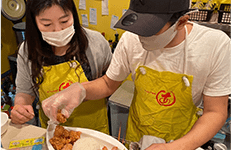
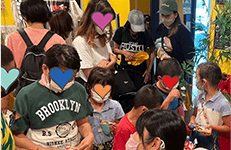
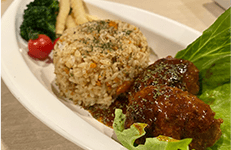
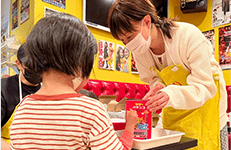
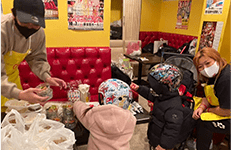
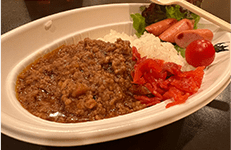
Also we’ve introduced take-out under the influence of COVID-19. None the less, it’s recognized as a place for the community to be. It has become a place for children and parents to interact with each other and we have received many comments of appreciation from them.
Voice of Kyoko Inoue, active professional wrestler Owner of Akayu kid's Cafeteria
Voice of Kyoko Inoue, active professional wrestler Owner of Akayu kid's Cafeteria

My parents owned a kappo izakaya (Japanese style dining bar).
Therefore my parents were always home, and there was always a hot meal.
However, many of today’s children have parent/s who work hard and are too busy, and I heard that many children eat cold meals alone.
I thought, “It must be lonely to eat alone…” So I started the Kid’s Cafeteria.
Now it is held twice a month, but there are children who come looking forward to eating there.
That is a treasure and I feel that we have done our best. I’m proud of it.
And more and more people are coming saying “It’s my first time!”
Also the number of children to whom we really wanted to deliver our services has been increasing.
They would come in around 4:00, eat here, and do their homework until their mom comes home. That would be ideal.
I’d like to keep going as long as I can, and I’d really like to increase the frequency, but I have my day job, so I think twice a month is my limit for now.
But to my delight, a college student was interested and contacted me to volunteer, and is now helping us.
At first, I made a lot of mistakes because I was alone, but I made a lot of improvements based on those mistakes.
Although it was only twice a month, more and more children came to look forward to eating at the children’s cafeteria. That alone makes me feel that all the hard work I put in was worth it.
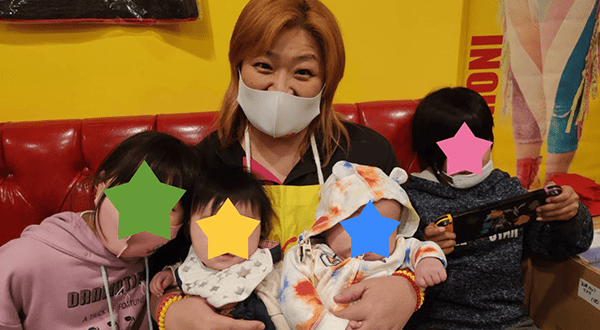
However, some of them fail because they don’t know how to do it. They don’t know how to advertise their activities to the people in need, and they can’t attract children even if they do hold an event. We have heard many such stories.
Operating a Kid’s Cafeteria is not easy, as there are many challenges.
We would like to expand the circle of the Nationwide Kid’s Cafeteria Project by working in partnership with and supporting these existing restaurants as well!
At first, we had a hard time attracting people who needed our service. We were only able to serve about 20 meals at first, but through repeated trial and error, we are now able to serve 150 meals on a consistent basis each time.
We are confident that our experience and know-how will enable us to increase the number of Kid’s Cafeterias throughout Japan and create a place for children to stay in the community.
Spreading Kid’s Cafeterias across the country, where children who are in poverty and feel loneliness can easily access them without feeling any guilt or shame! That is the mission of the Nationwide Kid’s Cafeteria Project in Japan.
Cancellation or suspension can be made at any time.
We're looking for others to join us in this endeavor to provide support truly needed and create a space where children can feel they belong to!
We're looking for others to join us in this endeavor to provide support truly needed and create a space where children can feel they belong to!
As community relations have become increasingly fragile in recent years, isolation due to poverty has become an even more serious problem. We cannot solve this problem with a single donation or a single support.
- Host Kid's Cafeterias on a continuous and regular basis
- Host Kid's Cafeterias as many time as possible
- Create as many Kid's Cafeterias (places they can belong to) as possible.
- Host Kid's Cafeterias on a continuous and regular basis
- Host Kid's Cafeterias as many time as possible
- Create as many Kid's Cafeterias (places they can belong to) as possible.
The donation, from $0.33 per day, of many people is helping to support this activity.
If you are interested in helping to alleviate poverty and isolation among children in Japan, please join us! We would be delighted!
Your ongoing support will protect the place for children in our community!
Monthly Support
(ongoing monthly donations)
When we operate a Kid’s Cafeteria
We are committed to the continuous operation of the cafeteria.
There is always a Kid’s Cafeterias on a certain day of the week,
and that alone makes it easier for people to gather and to provide emotional support.
Your continued support will support parents and children suffering from poverty and loneliness.
Cancellation or suspension can be made at any time.
※After the initial payment, you will be billed automatically every month, but you can stop at any time during the process.
Here are some of the voices of support we have received for our project.
Here are some of the voices of support we have received for our project.
Thank you all for your steady work, please continue your activities for the children.
Hello. I sent about 15 kg of rice (milled) today. I sent it in a plastic bag and a cardboard box to make it as small as possible. I hope everyone can enjoy it.
Hi, I saw your Facebook page and would like to make a small donation:))) I hope many people will donate to buy a big rice cooker and cook lots of delicious rice for children;-)
We would like to introduce some of the appreciative comments we have received from users of the Kid's Cafeteria.
We would like to introduce some of the appreciative comments we have received from users of the Kid's Cafeteria.
It has been a tremendous help to my family financially. The children are happy too, and it’s helping parents and children both.
It has been very helpful. It helps our family budget and the children enjoy the opportunity to eat together in this way.
Thank you for the other night. It was delicious! On Thursdays children ask "Today is akayu day!?" and they are so looking forward to it! Thank you very much!
I visited for the first time today with my children. We all enjoyed the curry! Children were also happy as they went home with snacks .. Thank you! And I forgot to pay for one adult and went home. I am sorry:( I will bring it with me next time, so if you could forgive me, I would appreciate it.
Thank you again for today! My three children love Akayu's curry, they eat more than my curry. lol Thanks again! We’ll come again!
We had a delicious and fun time with our kids! I look forward to next time!
The tangerine was very sweet. And the sakura mochi (rice cake with sakura blossom leaves) was a delightful seasonal treat.
Cancellation or suspension can be made at any time.
What is General Incorporated Association MIRAITERAS?
What is General Incorporated Association MIRAITERAS?
Having only been founded in 2022, it is still new as a private organization but the Kid’s Cafeteria has been in continuous operation for about three years since 2020.
The organization has held a Kid’s Cafeteria a total of 53 times and served a total of 3,860 meals to children and their parents in the local community.
In addition, even before the establishment of the incorporated association and the extensive publicity campaign, we have received donations and supplies (vegetables, rice, etc.) from 93 donors. And many others volunteered to help us. Many people empathize with our activities and thanks to their support we have been able to continue to operate the Kid’s Cafeteria.
By utilizing our experience and the operational know-how we have accumulated to date, we have been able to launch the “Nationwide Kid’s Cafeteria Project” in order to contribute to as many communities and children as possible.
※The number of Kid’s Cafeterias held and the number of meals served are approximate calculations based on past records as of November 10, 2022. This is a rough estimate calculated from past records. The actual number is higher than the above because some records are not kept.


Profile
After graduating from postgraduate school, he worked for a precision instruments manufacturer listed on the first section of the Tokyo Stock Exchange for 4 years, after which he started his own business. He has been involved in the Kid’s Cafeteria since 2020. Currently, as a social activist, he is working to develop Kid’s Cafeterias throughout Japan.Born in Shizuoka Prefecture. Father of one child. His mother is a former school lunch cook, and his wife is a cookery researcher and food coordinator. Because of that, he inevitably became interested in food education himself.
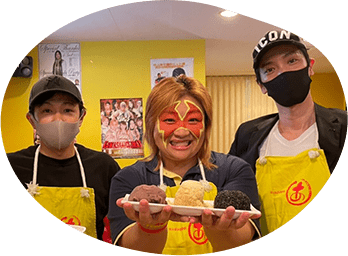 Hello, I am Masato Sano, Executive Director of the Nationwide Kid’s Cafeteria Project.
It has been three years now since I have been involved in the Kid’s Cafeteria.
Hello, I am Masato Sano, Executive Director of the Nationwide Kid’s Cafeteria Project.
It has been three years now since I have been involved in the Kid’s Cafeteria.I was originally invited by an acquaintance to participate as a volunteer staff member at the “Akayu Kid’s Cafeteria”, held at the restaurant of Kyoko Inoue, an active professional wrestler.
At first, I participated out of curiosity but as time went by I came to greatly appreciate the joy of interacting with the children and their parents and now I feel that the Kid’s Cafeteria is not only a “place for children” but also a “place for adults”.
 And recently I became a father myself and began to think more seriously about raising a child, the way we have meals, and how to interact with the community.
And recently I became a father myself and began to think more seriously about raising a child, the way we have meals, and how to interact with the community.
I am keenly aware that raising a child is only possible with a lot of support from the government and people in the community, and I recall that many people helped me when I was a child as well. Furthermore, I realized that the reason we are able to live safely every day in Japan is the result of the efforts of our predecessors, and that we are enjoying our affluence on top of that foundation for free.
 The more I learned about this, the more I felt strongly that I needed to pass on this gratitude to the next generation and I began to think about what I could do to contribute to the future of Japan.
So I started the Nationwide Kid’s Cafeteria Project.
The more I learned about this, the more I felt strongly that I needed to pass on this gratitude to the next generation and I began to think about what I could do to contribute to the future of Japan.
So I started the Nationwide Kid’s Cafeteria Project.
Although the number of Kid’s Cafeteria is increasing every year, the sufficiency rate is still only about 20% and it is estimated that there are about 220,000 elementary and junior high school students who are actually eating dinner alone.
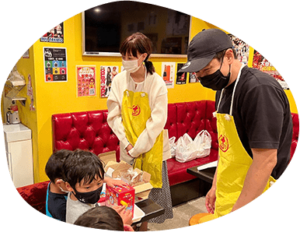 Parents both working are becoming the norm and the poverty rate is rising, with opportunities for families to enjoy a meal together slowly beginning to disappear.
Parents both working are becoming the norm and the poverty rate is rising, with opportunities for families to enjoy a meal together slowly beginning to disappear.
Under such circumstances the Kid’s Cafeteria also serves as a place for communication among local residents, where children who eat alone can be eliminated, where children can find a place to stay, and where office workers who come home late or families who have no time to do housework can get together and have a meal.
My mission now is to increase the number of such places as much as possible.

Hello, I am Masato Sano, Executive Director of the Nationwide Kid’s Cafeteria Project. It has been three years now since I have been involved in the Kid’s Cafeteria.
I was originally invited by an acquaintance to participate as a volunteer staff member at the “Akayu Kid’s Cafeteria”, held at the restaurant of Kyoko Inoue, an active professional wrestler.
At first, I participated out of curiosity but as time went by I came to greatly appreciate the joy of interacting with the children and their parents and now I feel that the Kid’s Cafeteria is not only a “place for children” but also a “place for adults”.

And recently I became a father myself and began to think more seriously about raising a child, the way we have meals, and how to interact with the community.
I am keenly aware that raising a child is only possible with a lot of support from the government and people in the community, and I recall that many people helped me when I was a child as well.
Furthermore, I realized that the reason we are able to live safely every day in Japan is the result of the efforts of our predecessors, and that we are enjoying our affluence on top of that foundation for free.

The more I learned about this, the more I felt strongly that I needed to pass on this gratitude to the next generation and I began to think about what I could do to contribute to the future of Japan. So I started the Nationwide Kid’s Cafeteria Project.

Although the number of Kid’s Cafeteria is increasing every year, the sufficiency rate is still only about 20% and it is estimated that there are about 220,000 elementary and junior high school students who are actually eating dinner alone.
Parents both working are becoming the norm and the poverty rate is rising, with opportunities for families to enjoy a meal together slowly beginning to disappear.
Under such circumstances the Kid’s Cafeteria also serves as a place for communication among local residents, where children who eat alone can be eliminated, where children can find a place to stay, and where office workers who come home late or families who have no time to do housework can get together and have a meal.
My mission now is to increase the number of such places as much as possible.
Q&A about donation
Q&A
about donation
https://billing.stripe.com/p/login/00g03z5vhd5qdhubII
*You can stop your monthly payment by logging in with the e-mail address you entered at the time of payment and selecting “Change Plan” in the menu.
If you have any questions Please contact the following office.
General Incorporated Association MIRAITERAS
Eメール:info@miraiteras.net
Cancellation or suspension can be made at any time.
© 2022 General Incorporated Association MIRAITERAS




